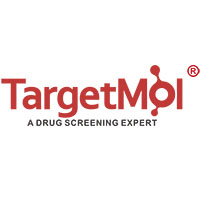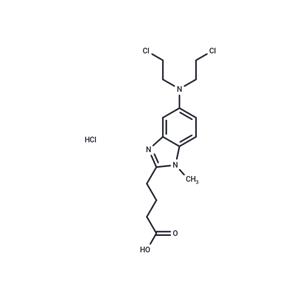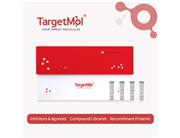| Name | Bendamustine hydrochloride |
| Description | Bendamustine hydrochloride (EP-3101) (IC50 of 50 μM) is an alkylating agent associated with DNA damage. |
| Cell Research | SU-DHL-1 and SU-DHL-9 cells are preincubated for 30 minutes with either 6 mM methoxyamine or 50 μM O6-benzylguanine, inhibitors of Ape-1 base excision repair enzyme, or alkylguanyl transferase enzyme, respectively. The cells are then exposed to various concentrations of Bendamustine for 72 hours. Cytotoxicity is evaluated by the MTT viability assay and an IC50 is determined as the drug concentration that inhibited by 50% the viability value of the untreated control. Analyses are done.(Only for Reference) |
| In vitro | Bendamustine causes more extensive and effective DNA single- and double-strand breaks than cyclophosphamide, Cisplatinum, or carmustine.Bendamustine inhibits mitotic assays and causes mitotic mega-mutations.Bendamustine regulates genes involved in apoptosis, DNA repair, and mitotic assays. Bendamustine had a very low teratogenic effect compared to an equimolar dose of Lomustine.26% of Bendamustine-treated MCF-7/ADR cells showed micronucleation compared to 6% of DMSO-treated cells. Bendamustine alone at concentrations ranging from 1 μg/mL to 50 μg/mL showed dose- and time-dependent effects with toxicity ranging from 30.4% to 94.8% observed after 48 hours. The LD50 of untreated and pretreated CLL cells was 7.3 or 4.4 μg/mL, respectively. Bendamustine treatment of SU-DHL-9 cells resulted in a 60% to 80% down-regulation of the mRNA expression of all three of these genes (polo-like kinase 1, Aurora kinase A, and cyclin B1). Bendamustine acts on non-Hodgkin's lymphocytes and uniquely regulates DNA repair pathways compared to other alkylating agents. Myeloid and breast cancer cells are resistant to Bendamustine, but HL-60 cells are moderately sensitive to Bendamustine. |
| In vivo | Bendamustine causes more extensive and effective DNA single- and double-strand breaks than cyclophosphamide, Cisplatinum, or carmustine.Bendamustine inhibits mitotic assays and causes mitotic mega-mutations.Bendamustine regulates genes involved in apoptosis, DNA repair, and mitotic assays. Bendamustine had a very low teratogenic effect compared to an equimolar dose of Lomustine.26% of Bendamustine-treated MCF-7/ADR cells showed micronucleation compared to 6% of DMSO-treated cells. Bendamustine alone at concentrations ranging from 1 μg/mL to 50 μg/mL showed dose- and time-dependent effects with toxicity ranging from 30.4% to 94.8% observed after 48 hours. The LD50 of untreated and pretreated CLL cells was 7.3 or 4.4 μg/mL, respectively. Bendamustine treatment of SU-DHL-9 cells resulted in a 60% to 80% down-regulation of the mRNA expression of all three of these genes (polo-like kinase 1, Aurora kinase A, and cyclin B1). Bendamustine acts on non-Hodgkin's lymphocytes and uniquely regulates DNA repair pathways compared to other alkylating agents. Myeloid and breast cancer cells are resistant to Bendamustine, but HL-60 cells are moderately sensitive to Bendamustine. |
| Storage | Powder: -20°C for 3 years | In solvent: -80°C for 1 year | Shipping with blue ice/Shipping at ambient temperature. |
| Solubility Information | Ethanol : 14 mg/mL (35.47 mM), Sonication is recommended.
H2O : 2 mg/mL (5.07 mM), Sonication is recommended.
10% DMSO+40% PEG300+5% Tween 80+45% Saline : 2 mg/mL (5.07 mM), Sonication is recommended.
DMSO : 60 mg/mL (152.01 mM), Sonication is recommended.
|
| Keywords | SDX105 | SDX 105 | RNASynthesis | RNA Synthesis | EP3101 | EP 3101 | DNASynthesis | DNAAlkylator | DNA synthesis | DNA Synthesis | DNA Alkylator/Crosslinker | DNA Alkylator | Crosslinker | Bendamustine | Apoptosis | antimetabolite |
| Inhibitors Related | Stavudine | 5-Fluorouracil | Cysteamine hydrochloride | Sodium 4-phenylbutyrate | L-Ascorbic acid | Guanidine hydrochloride | L-Glutamic acid | Tributyrin | Thymidine | L-Ascorbic acid sodium salt | Alginic acid | Dextran sulfate sodium salt (MW 5000) |
| Related Compound Libraries | Failed Clinical Trials Compound Library | Bioactive Compound Library | Anti-Breast Cancer Compound Library | Anti-Cancer Clinical Compound Library | Drug Repurposing Compound Library | FDA-Approved Drug Library | Anti-Cancer Approved Drug Library | Immunology/Inflammation Compound Library | Anti-Aging Compound Library | Bioactive Compounds Library Max | Anti-Cancer Drug Library | Anti-Cancer Active Compound Library |

 United States
United States




